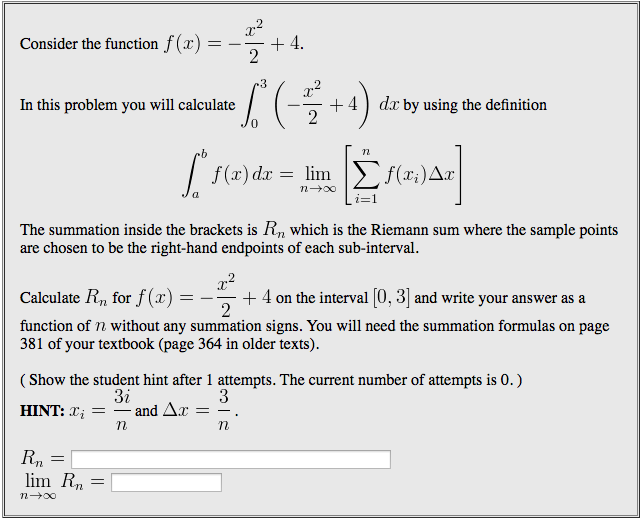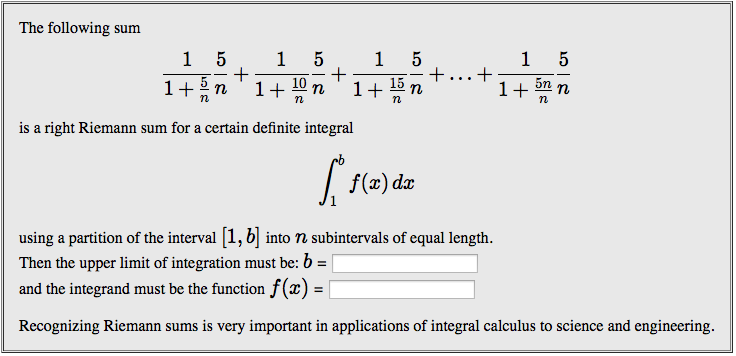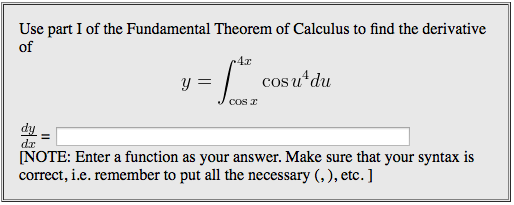Section 5.2, #4

Here $f(x) = 3x^2 + 4x + 3$ and the interval of integration is $[5, 11]$. Since $n = 3$, $\Delta x = (11 - 5) / 3 = 6 / 3 = 2$. Therefore, the subintervals are $[5, 7], [7, 9]$ and $[9, 11]$. Using the right endpoints of the subintervals for our sample points $x_i^*$, we would be evaluating $f$ at $7, 9$ and $11$. Putting this together to approximate the definite integral of $f$ using right endpoints (a "right-Riemann sum") gives:
$$\begin{align*} \begin{split} \int_5^{11} f(x)\,dx &\approx \sum_{i = 1}^3 f(x_i^{\star}) \Delta x \\ &= f(7)(2) + f(9)(2) + f(11)(2)\\[1ex] &= (3(7)^2 + 4(7) + 3)(2) + (3(9)^2 + 4(9) + 3)(2)\\ &\qquad + (3(11)^2 + 4(11) + 3)(2)\\[1ex] &= 178(2) + 282(2) + 410(2)\\[1ex] &= 1740 \end{split} \end{align*}$$
Section 5.2p2, #2

In this problem, $R_n$ represents $\sum_{i=1}^n f(x_i)\Delta x$, where $x_i$ is the right endpoint of the $i$ th subinterval and $f(x) = -\frac{1}{2}\,x^2 + 4.$
We partition the interval of integration $[0, 3]$ into $n$ subintervals, each of width $\Delta x = \frac{3 - 0}{n} = \frac{3}{n}$. Since the left endpoint of the interval of integration is 0, the coordinate of the right endpoint of the $i$ th subinterval, $x_i$, is given by $x_i = i \Delta x = \frac{3i}{n}$.
The value of $f$ at the right endpoint of the $i$ th subinterval is given by
$$f(x_i) = -\frac{1}{2}\left(\frac{3i}{n}\right)^2 + 4 = -\frac{9i^2}{2n^2} + 4$$
Putting this all together, we have
$$R_n = \sum_{i=1}^n f(x_i)\Delta x = \sum_{i=1}^n \left(-\frac{9i^2}{2n^2} + 4\right)\frac{3}{n} = \sum_{i=1}^n \left(-\frac{27i^2}{2n^3} + \frac{12}{n} \right)$$
We now need to use the various properties of sums to express $R_n$ as a function of $n$ (without the summation sign.) Doing this gives
$$R_n = -\frac{27}{2n^3}\sum_{i=1}^n i^2 + \frac{1}{n}\sum_{i=1}^n 12$$
Note that for a given value of $n$, factors containing $n$ are constants and can, therefore, be factored out of the sums. We now use the formulas
$$\sum_{i=1}^n i^2 = \tfrac{1}{6}(n)(n+1)(2n+1) \text{ and } \sum_{i=1}^n 12 = 12n$$
to replace the sums in our expression for $R_n$ to get
$$ \begin{align*} R_n &= -\frac{27}{2n^3}\cdot\frac{1}{6}(n)(n+1)(2n+1) + \frac{1}{n}(12n) \\[1.5ex] &= -\frac{9}{4}\cdot\frac{n}{n}\cdot\frac{n+1}{n}\cdot\frac{2n+1}{n} + 12\\[1.5ex] &= -\frac{9}{4}\left(\frac{n+1}{n}\right)\left(\frac{2n+1}{n}\right) + 12 \end{align*} $$
Section 5.2p2, #1

In this problem we are given the terms of the Riemann sum of some function $f(x)$ over some interval $[a, b]$. From the form of the terms we are to determine the function $f$ and the upper limit of integration $b$. To do this we compare the form of the given terms with those in the definition of the definite integral of a function $f$ over an interval $[a, b]$,
$$ \begin{align*} \int_a^b f(x)\,dx &= \sum_{i=1}^n f(x_i^\star)\Delta x \\[1.5ex] &= f(x_1^\star)\Delta x + f(x_2^\star)\Delta x + f(x_3^\star)\Delta x + \cdots + f(x_n^\star)\Delta x \end{align*} $$
where $x_i^\star$ is a the sample point within the $i$th interval where we evaluate the function and $\Delta x$ is the width of the interval. Here we are assuming that the interval is partitioned into $n$ subintervals of equal width, hence $\Delta x = (b - a)/n$.
If we choose our sample point $x_i^\star$ as the right endpoint of the $i$th subinterval, then $x_i^\star = x_i$. We can get the coordinate of $x_i$ by starting from the left endpoint of the interval $[a, b]$ and adding $\Delta x$ a total of $i$ times. Therefore, $x_i = a + i\Delta x$.
We now have enough information to put the pieces together. The terms of the Riemann sum have the form $f(x_i)\Delta x$, where $\Delta x = (b - a)/n$ and $x_i = a + i\Delta x = a + i(b-a)/n$. Looking at the given terms of the Riemann sum we see that:
- $f(x_1)\Delta x = \frac{1}{1+(5/n)}\cdot\frac{5}{n}$
- $f(x_2)\Delta x = \frac{1}{1+2(5/n)}\cdot\frac{5}{n}$
- $f(x_3)\Delta x = \frac{1}{1+3(5/n)}\cdot\frac{5}{n}$
- $\vdots$
- $f(x_n)\Delta x = \frac{1}{1+n(5/n)}\cdot\frac{5}{n}$
From this we can relate $\Delta x$ to $\frac{5}{n}$. Since $\Delta x = \frac{b - a}{n}$ and we know that $a = 1$ (it is the left endpoint of the interval of integration), we conclude that $b = 6$.
Finally, we see that the factors of $\Delta x$ in the Riemann sum must be
$$f(x_i) = f(a + i\Delta x) = f(1 + i(5/n)) = \frac{1}{1 + i(5/n)}$$
Hence, $f(x) = \frac{1}{x}$.
Section 5.3, #10

We will use the Fundamental Theorem of calculus
$$\frac{d}{dx}\int_a^x f(u)\,du = f(x)$$
to differentiate the given function of $x$ but have to break up the integral (function) into two seperate integrals (functions of $x$) and apply a property of integrals to put each one into the proper form; Integrating from a constant limit to a variable (function of $x$) limit. Also we will need to use the chain rule to differentiate each integral (function) since the upper limit of integration will itself be a function of $x$.
Doing this gives:
$$ \begin{align*} \frac{d}{dx} \int_{\cos x}^{4x} \cos(u^4)\,du &=\frac{d}{dx}\left(\int_{\cos x}^0 \cos(u^4)\,du + \int_0^{4x} \cos(u^4)\,du\right)\\[1.5ex] &=\frac{d}{dx}\left(-\int_0^{\cos x} \cos(u^4)\,du + \int_0^{4x} \cos(u^4)\,du\right)\\[1.5ex] &=\frac{d}{dx}\left(-\int_0^{\cos x} \cos(u^4)\,du\right) + \frac{d}{dx}\left(\int_0^{4x} \cos(u^4)\,du\right)\\[1.5ex] &= -\cos(\cos^4 x)(-\sin x) + \cos((4x)^4)(4)\\[1.5ex] &= (\sin x)\cos(\cos^4 x) + 4\cos(256x^4) \end{align*} $$